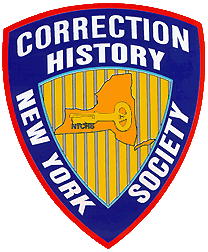|
|
|||
 |
The Webmaster |
 |
|
|
|
|||
 |
The Webmaster |
 |
|
This year [published in 1995] the Department marks the 20th anniversary of the shooting death of Correction Officer George Motchan for whom a Rikers Island jail is named.
Shortly after 9 a.m., Sept.9, 1975, Officers Motchan and Joseph Connors escorted inmate Joseph James to the Kings County Hospital dental clinic from the Brooklyn House of Detention. Detained on robbery and murder charges, James was handcuffed to Officer Motchan who, for that reason, was not carrying a firearm. As backup officer, Connors was armed. About 10 a.m. the inmate asked to use the bathroom where, by prearrangement, a girl friend had hidden a gun behind the commode. On seeing the prisoner emerge from the stall with the weapon, Motchan turned and shouted to C.O. Connors standing outside the bathroom door, “Watch out; he’s got a gun!” As Motchan uttered the warning, he was shot by James who rushed into the crowded waiting room, gun blazing. For fear of hitting bystanders, Connors dared not shoot but placed himself in the line of fire to protect others. James wounded Connors and a female patient before fleeing to a waiting car. Seriously wounded, Connors survived but his injuries prevented his continuing in Correction service. Officer Motchan died at KCH six days later, Sept. 15. Seventeen years in DOC, the 45-year-old Motchan had been planning for retirement in three years. He left a wife, Dolly; a son, George Jr., then 20; a daughter, Mrs. Kathy Dory, then 23, and a granddaughter, Eileen, then seven months. The Motchans had celebrated their 25th wedding anniversary at a party given them by their children the preceding June. The party photos arrived at the Motchan’s home only days before his death.
Saturday morning, Sept. 19, Mayor Abraham Beame, other city leaders and an honor guard of 600 Correction Officers stood at attention in the rain as the flag-drapped casket was carried into St. Rita’s Roman Catholic Church, Staten Island, for solemn requiem mass. Some eight hours earlier Officer Motchan’s killer had been recaptured in the apartment of a female friend in Brooklyn. One year later a jury deliberated three hours, following a six-day trial, before convicting James of Murder in the First Degree. On Nov. 23, 1977, as mandated by the law then, he was sentenced to the electric chair but appealed. At that time in New York State, capital punishment was restricted to cases involving the murder of peace officers. Two years after the slaying of Officer Motchan, the state’s top court heard arguments on James' appeal that the mandatory feature of New York’s capital punishment law violated the U.S. Constitution. On Nov. 15, 1977, by a 4-to-3 decision on the Motchan murder sentence appeal, the state court voided automatic death sentences for the killing of peace officers while in performance of their duties. As a result, on Dec. 10, 1977, James was removed from death row in Greenhaven State Prison, Dutchess County, the last capital sentence inmate to occupy any of its 13 cells. The Brooklyn District Attorney’s request for a U.S. Supreme Court review of the New York Court of Appeals decision in the Motchan murder case was denied July 5, 1978. James was resentenced on Aug. 7, 1978, to serve 25-years-to-life for the killing of Officer Motchan. He is currently serving that term in the Sullivan County Correctional Facility. He becomes eligible for parole consideration in the year 2000, the 25th anniversary of Officer Motchan’s death. [Webmaster's note: The inmate is currently at Great Meadow CF.] On June 12, 1989, then Correction Commissioner Richard J. Koehler unveiled a bronze plaque, mounted near the entrance of C-73, that reads, in part: “This facility is dedicated to the memory of Correction Officer George Motchan who valiantly gave his life in the line of duty ....” Attending the GMDC dedication six years ago were members of the family.
George Motchan, his sister and two brothers were raised in the Bedford-Stuyvesant section of Brooklyn. He was about 13 years old when his mother died. At 15, he went to work in the Knox Hat factory on Grand Ave. and St. Marks Place. There he met a pretty co-worker, Raffaele (“Dolly”) Ovale, 16. They wed four years later. Before joining DOC, he worked at a variety of jobs: furniture truck driver, railroad trackman, pharmaceutical factory hand, and Merchant Marine. His daughter, Kathy, remembers him as “a warm, friendly, outgoing, take-charge kind of person . . . handy with tools, quick to organize a community project or outing . . . ever ready to help at home, in the neighborhood, or on the road with stranded motorists.” She remembers total strangers coming to the door of the Motchan home on Staten Island, “bringing a gift of fresh-baked cookies as a way of saying thanks to my dad who came to their aid on the highway. He had never mentioned it.” His widow, Dolly, recalls: “The night before the shooting, he had an upset stomach and wasn’t feeling well but went on the job anyway because he had only just returned to work after our Silver Wedding Anniversary cruise. He even took another officer’s shift and that’s when it happened. I was called to the hospital not really knowing why, or how I got there. A security guard said, ‘Oh, you’re the lady whose husband got shot.' "When I could speak with George, he kept saying, ‘Get the wallet and the keys.’ But later I learned they had been stolen in the hospital after the gunman escaped. Who took them, no one knows. I had to change the locks.”
At the time of his father’s death, George Jr., was a college student hoping to pursue medical studies. Bureau Chief Arnett Gaston remembers, "George Senior wanted to help make happen his son’s dream of becoming a doctor. Officer Motchan often worked overtime so that he could help with the educational expenses. His passing posed the possibility that the dream he shared with his son would not be fulfilled." Then-Commissioner Benjamin Malcolm and the leadership of the Correction Officers Benevolent Association joined forces in contacting medical school officials to bring to their attention some of the circumstances surrounding young Motchan’s application for admission. In those days, Chief Gaston served as the Commissioner’s executive assistant. He recollects: “We all knew that, if George’s son were given a fair chance, admissions officials would see in him a highly-qualified, strongly-motivated applicant who would succeed. We simply tried to make sure his application was seriously considered and he had an opportunity to present himself. "That’s what happened. George Junior made it on his own merit and by his own effort. It’s what his dad wanted for him.” George’s son remembers, “My dad much admired the service rendered to people in need by doctors he knew at Kings County Hospital where he worked. That’s one reason he encouraged me to pursue a medical career.” A commemorative plaque, with Officer George Motchan’s Shield 2584 mounted on it, adorns a wall of the Prison Ward. It reads: Honoring the memory of Correction Officer George Motchan who unselfishly gave his life in the line of duty . . . Dedicated by his fellow officers. Today Dr. George Motchan is an Atlanta cardiac anesthesiologist who lives in Marrietta, Ga., with his wife, Jodie, and three daughters, Brooke, 12; Jaye, 8, and Tori, 1. His sister, Kathy, a public school paraprofessional, lives on Staten Island with her husband, Bill Dory, a retired Police Officer from the 78th Precinct, and their two daughters, Eileen, 20, and Kelly, 18, both attending college. “George would have been delighted at having five fine granddaughters; he was so taken with our first, Eileen, who was an infant when he died,” said his widow, Dolly. “He was so proud of his family . . . " She did not have to add the unspoken words “. . . and his family was so proud of him.” So is this Department. |
[Previous Motchan Story Page] [NYCHS Home Page] [In Memoriam Starter Page]